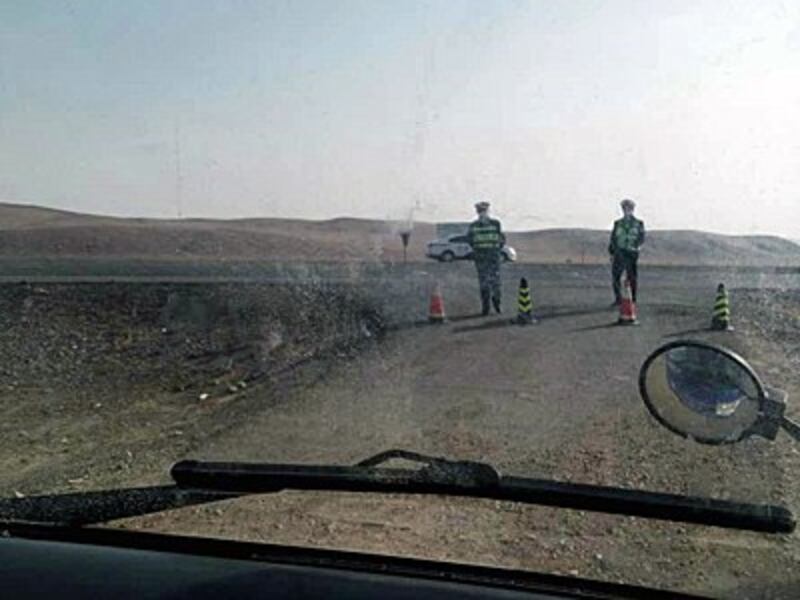Chinese police in the northern region of Inner Mongolia have detained an ethnic Mongolian herder who spoke out about pollution from nearby smelting plants that has left local people with higher cancer rates, herders with piles of dead livestock and poisoned the soil and water.
Authorities in the region's Zaruud Banner (Zaluteqi in Chinese) detained herder Nasanulzei after he spoke out about the death of his sheep amid growing pollution protests near Arikunduleng township.
Hundreds of residents of Ar-Hundelen Som, a grouping of yurt “villages” on traditional grazing lands near Arikunduleng, have stepped up protests since last week over pollution from alumina plants near their traditional grazing lands that they say is affecting people and animals alike.
"In the early hours of this morning, more than a dozen police burst into the home of Nasanulzei in Arikunduleng township and took him away," a herder who asked to remain anonymous told RFA on Tuesday.
"They didn't show any official documentations like an arrest warrant, or show any official police ID or anything like that," the herder said. "We don't know where they have taken him."
More join protest
The detention comes after protests from more than 300 Mongolian herders since last Friday in front of alumina smelting plants in neighboring Huuliin-gol.
The ethnic Mongolian herders have been joined in their protest by Han Chinese residents of Arikunduleng township who have also been affected by the pollution, according to ethnic Mongolian rights activist Xinna.
"I have been hearing that Han Chinese and ethnic Mongolians protested together outside the alumina plant," Xinna said.
"On this issue, they are of one mind, because everyone is finding it hard to exist now," she said.
On Saturday, hundreds of police in full riot gear beat up dozens of protesters and briefly detained around 20 people, who were later released, local residents told RFA.
Local police and government officials have confirmed to RFA that there is a serious pollution problem in the area, but say the smelting plants are located in a separate jurisdiction.
Nasanulzei's detention came after he released a cell phone video showing piles of dead or twitching ewes and lambs recently poisoned by soil and water pollution.
His testimony was also quoted by the U.S.-based Southern Mongolian Human Rights Information Center (SMHRIC).
But the herder who spoke to RFA on Tuesday said Nasanulzei had done nothing wrong.
"All he did was put out details of the deaths of his own livestock because of pollution from the chemical plant," the herder said. "He has done nothing wrong."

Police close roads
A second herder said police have now sealed off local roads to prevent local herders from traveling to the smelting plants to continue their protests.
"All of the roads between Arikunduleng township and the chemical plants have been blocked since yesterday, and the police are checking every vehicle," the second herder said.
"If they find anyone with a driver's license from Arikunduleng or Ar-Hundelen Som, they refuse to let them through."
"If they find anyone from [those places] onboard another vehicle, they make them get out to stop them getting as far as the smelting plants," the herder said.
But he said local people had tried other ways of getting to the plants.
"Yesterday, they started going there on foot," he said.
Cell phone signals blocked
Local residents said their cell phone signals have been blocked since reports began to emerge overseas of the pollution protests.
Meanwhile, local officials held an emergency meeting with the management of the Huuliin-gol industrial plant late on Monday, during which the Arikunduleng township authorities were threatened with reports to their superiors in the regional capital Hohhot if they didn't bring the situation under control soon, sources told RFA.
Germany-based ethnic Mongolian rights activist Xi Haiming said the alumina plant pollution is posing a huge threat to human and animal health.
"If they can't graze their sheep, then ethnic Mongolians have no livelihood," Xi said. "The pollution causes long-tooth deformities in sheep, which makes it impossible to farm them."
"The herders are calling for transparency, for compensation, and for medical checks for themselves," Xi said. "This shouldn't be too hard [for the government] to achieve."
He said there has been an increase in pollution cases that straddle administrative borders and districts in recent years.
"In Inner Mongolia in particular, the huge expanse of land, rich resources and low labor costs are actually threatening the existence of ethnic Mongolians," Xi said.
Reported by Qiao Long for RFA's Mandarin Service, and by Lin Jing and Chan Siu-po for the Cantonese Service. Translated and written in English by Luisetta Mudie.
